Impact of Disruptive Technologies in Hospitality: A Report
VerifiedAdded on 2023/01/12
|16
|3052
|41
Report
AI Summary
This report, prepared for HTL604: Entrepreneurship for Hospitality Leaders, delves into the impact of disruptive technologies on the tourism and hospitality industries. It explores the Internet of Things (IoT), Artificial Intelligence (AI), and Robotics, analyzing their applications and advantages, such as enhanced customer experience and operational efficiency, while also acknowledging their disadvantages, like privacy concerns and high implementation costs. The report examines the influence of these technologies on customer service, personalization, service delivery time, and data management, highlighting the need for hospitality leaders to innovate, integrate technology, focus on execution, and collaborate with customers to manage these changes effectively. The conclusion emphasizes the importance of adapting to evolving customer expectations and leveraging technology to enhance brand relevance and customer loyalty.
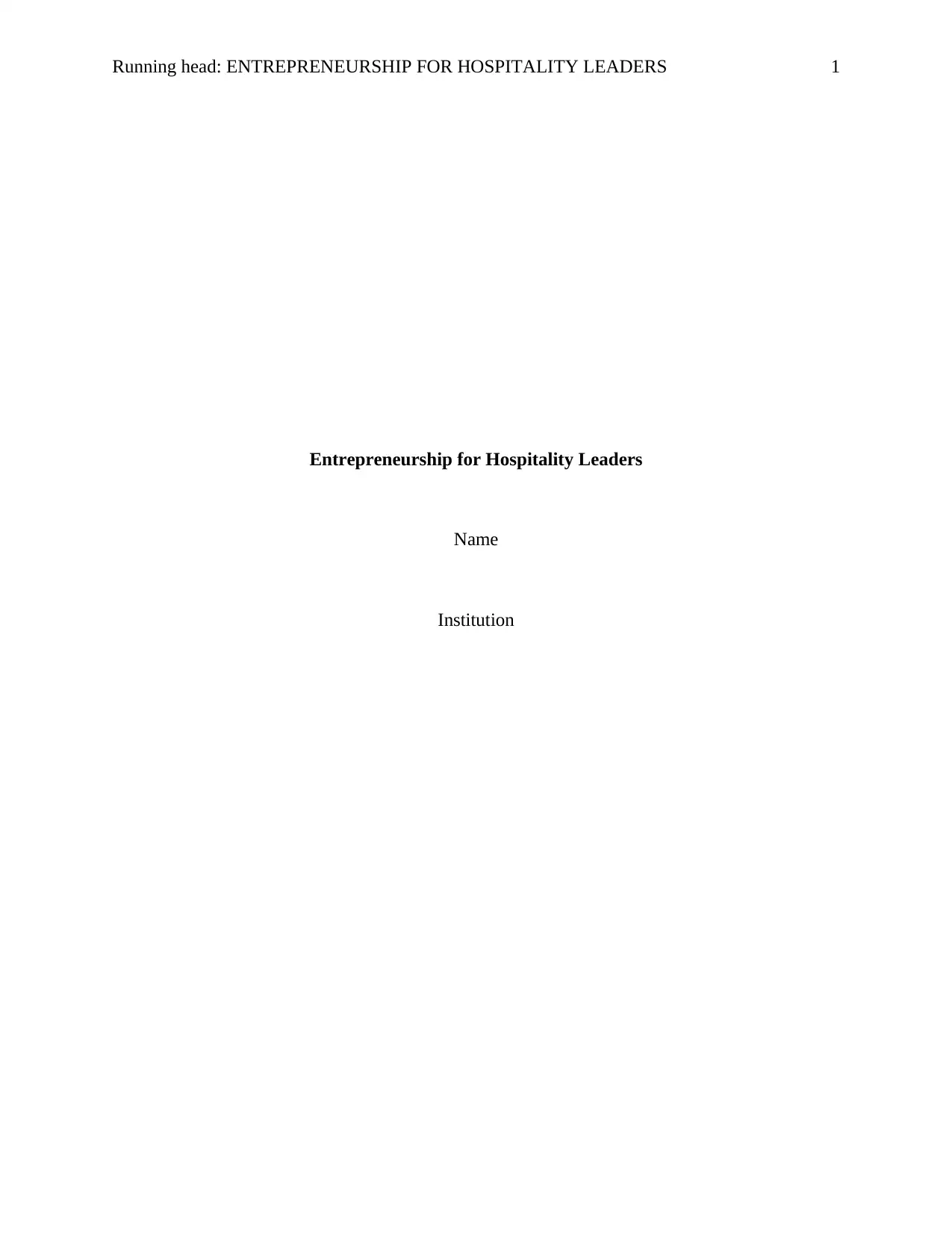
Running head: ENTREPRENEURSHIP FOR HOSPITALITY LEADERS 1
Entrepreneurship for Hospitality Leaders
Name
Institution
Entrepreneurship for Hospitality Leaders
Name
Institution
Paraphrase This Document
Need a fresh take? Get an instant paraphrase of this document with our AI Paraphraser
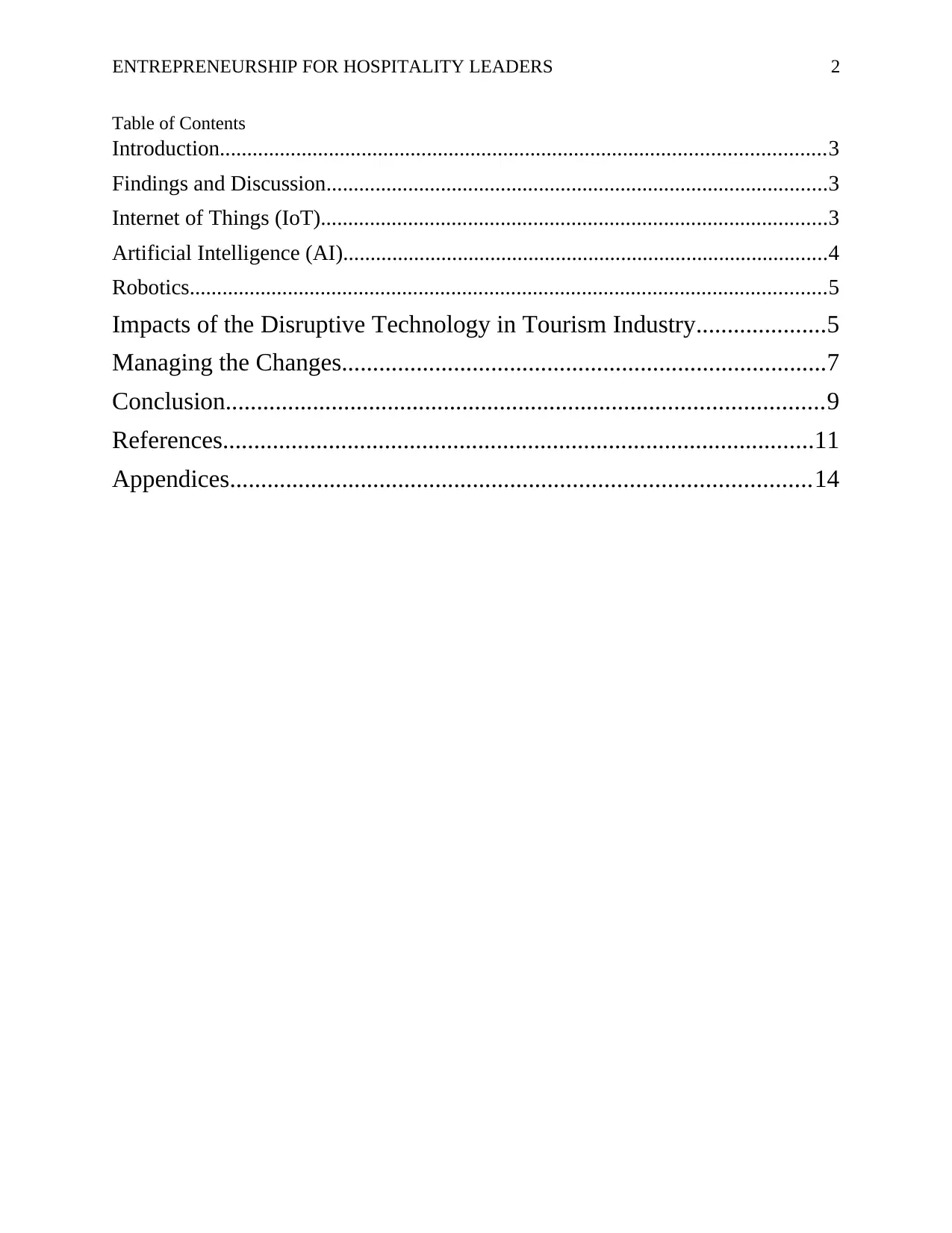
ENTREPRENEURSHIP FOR HOSPITALITY LEADERS 2
Table of Contents
Introduction...............................................................................................................3
Findings and Discussion............................................................................................3
Internet of Things (IoT).............................................................................................3
Artificial Intelligence (AI).........................................................................................4
Robotics.....................................................................................................................5
Impacts of the Disruptive Technology in Tourism Industry.....................5
Managing the Changes..............................................................................7
Conclusion................................................................................................9
References...............................................................................................11
Appendices.............................................................................................14
Table of Contents
Introduction...............................................................................................................3
Findings and Discussion............................................................................................3
Internet of Things (IoT).............................................................................................3
Artificial Intelligence (AI).........................................................................................4
Robotics.....................................................................................................................5
Impacts of the Disruptive Technology in Tourism Industry.....................5
Managing the Changes..............................................................................7
Conclusion................................................................................................9
References...............................................................................................11
Appendices.............................................................................................14
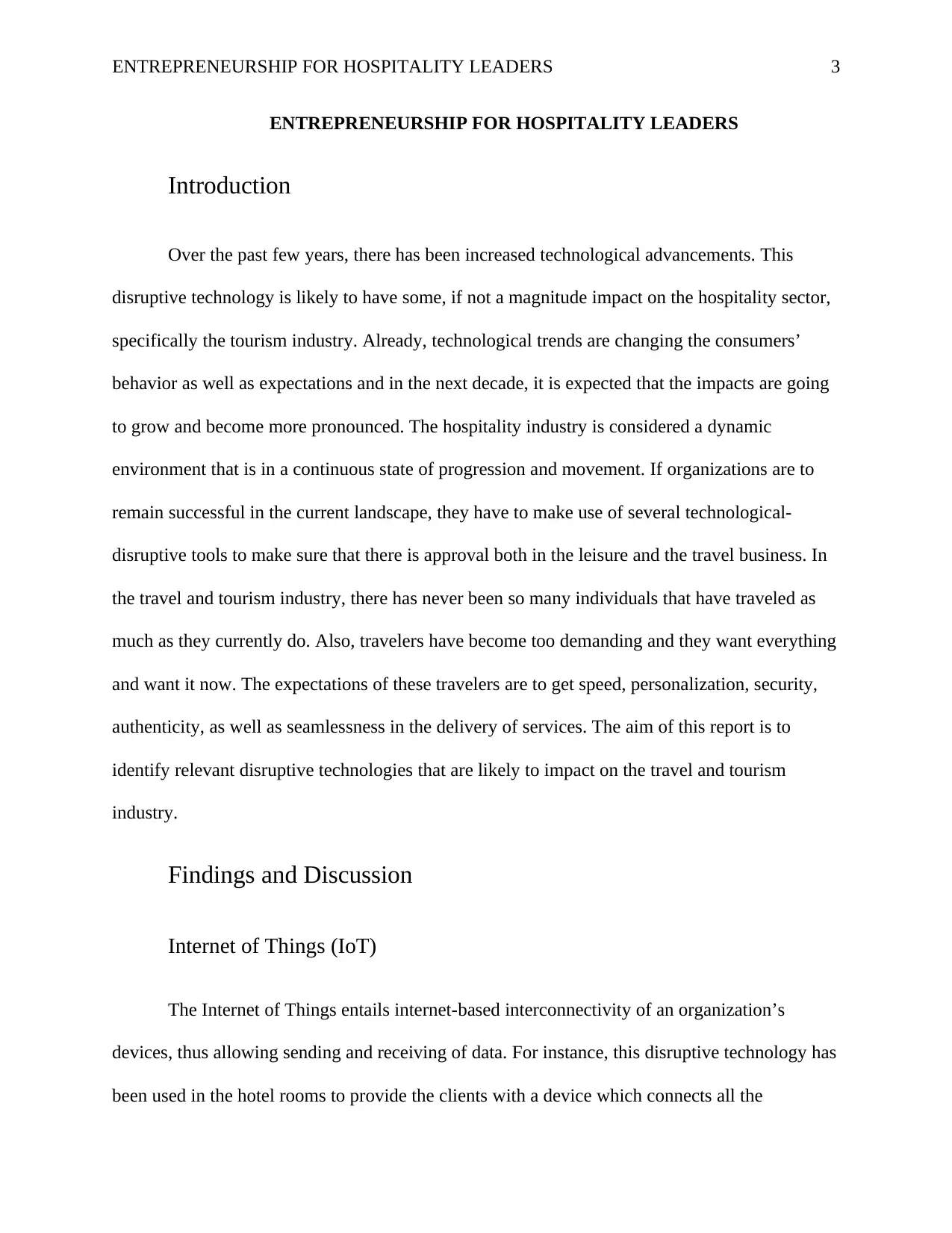
ENTREPRENEURSHIP FOR HOSPITALITY LEADERS 3
ENTREPRENEURSHIP FOR HOSPITALITY LEADERS
Introduction
Over the past few years, there has been increased technological advancements. This
disruptive technology is likely to have some, if not a magnitude impact on the hospitality sector,
specifically the tourism industry. Already, technological trends are changing the consumers’
behavior as well as expectations and in the next decade, it is expected that the impacts are going
to grow and become more pronounced. The hospitality industry is considered a dynamic
environment that is in a continuous state of progression and movement. If organizations are to
remain successful in the current landscape, they have to make use of several technological-
disruptive tools to make sure that there is approval both in the leisure and the travel business. In
the travel and tourism industry, there has never been so many individuals that have traveled as
much as they currently do. Also, travelers have become too demanding and they want everything
and want it now. The expectations of these travelers are to get speed, personalization, security,
authenticity, as well as seamlessness in the delivery of services. The aim of this report is to
identify relevant disruptive technologies that are likely to impact on the travel and tourism
industry.
Findings and Discussion
Internet of Things (IoT)
The Internet of Things entails internet-based interconnectivity of an organization’s
devices, thus allowing sending and receiving of data. For instance, this disruptive technology has
been used in the hotel rooms to provide the clients with a device which connects all the
ENTREPRENEURSHIP FOR HOSPITALITY LEADERS
Introduction
Over the past few years, there has been increased technological advancements. This
disruptive technology is likely to have some, if not a magnitude impact on the hospitality sector,
specifically the tourism industry. Already, technological trends are changing the consumers’
behavior as well as expectations and in the next decade, it is expected that the impacts are going
to grow and become more pronounced. The hospitality industry is considered a dynamic
environment that is in a continuous state of progression and movement. If organizations are to
remain successful in the current landscape, they have to make use of several technological-
disruptive tools to make sure that there is approval both in the leisure and the travel business. In
the travel and tourism industry, there has never been so many individuals that have traveled as
much as they currently do. Also, travelers have become too demanding and they want everything
and want it now. The expectations of these travelers are to get speed, personalization, security,
authenticity, as well as seamlessness in the delivery of services. The aim of this report is to
identify relevant disruptive technologies that are likely to impact on the travel and tourism
industry.
Findings and Discussion
Internet of Things (IoT)
The Internet of Things entails internet-based interconnectivity of an organization’s
devices, thus allowing sending and receiving of data. For instance, this disruptive technology has
been used in the hotel rooms to provide the clients with a device which connects all the
⊘ This is a preview!⊘
Do you want full access?
Subscribe today to unlock all pages.

Trusted by 1+ million students worldwide
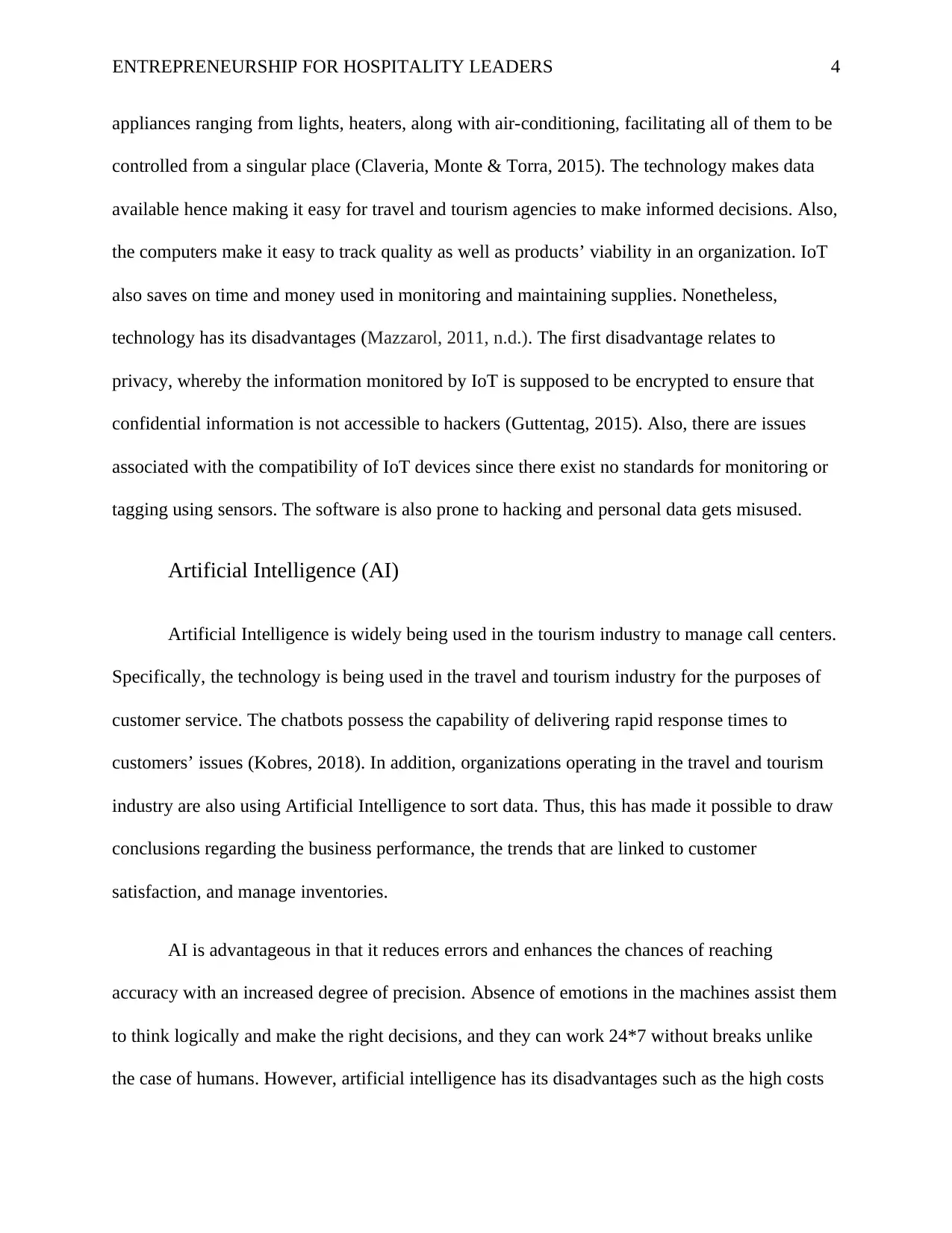
ENTREPRENEURSHIP FOR HOSPITALITY LEADERS 4
appliances ranging from lights, heaters, along with air-conditioning, facilitating all of them to be
controlled from a singular place (Claveria, Monte & Torra, 2015). The technology makes data
available hence making it easy for travel and tourism agencies to make informed decisions. Also,
the computers make it easy to track quality as well as products’ viability in an organization. IoT
also saves on time and money used in monitoring and maintaining supplies. Nonetheless,
technology has its disadvantages (Mazzarol, 2011, n.d.). The first disadvantage relates to
privacy, whereby the information monitored by IoT is supposed to be encrypted to ensure that
confidential information is not accessible to hackers (Guttentag, 2015). Also, there are issues
associated with the compatibility of IoT devices since there exist no standards for monitoring or
tagging using sensors. The software is also prone to hacking and personal data gets misused.
Artificial Intelligence (AI)
Artificial Intelligence is widely being used in the tourism industry to manage call centers.
Specifically, the technology is being used in the travel and tourism industry for the purposes of
customer service. The chatbots possess the capability of delivering rapid response times to
customers’ issues (Kobres, 2018). In addition, organizations operating in the travel and tourism
industry are also using Artificial Intelligence to sort data. Thus, this has made it possible to draw
conclusions regarding the business performance, the trends that are linked to customer
satisfaction, and manage inventories.
AI is advantageous in that it reduces errors and enhances the chances of reaching
accuracy with an increased degree of precision. Absence of emotions in the machines assist them
to think logically and make the right decisions, and they can work 24*7 without breaks unlike
the case of humans. However, artificial intelligence has its disadvantages such as the high costs
appliances ranging from lights, heaters, along with air-conditioning, facilitating all of them to be
controlled from a singular place (Claveria, Monte & Torra, 2015). The technology makes data
available hence making it easy for travel and tourism agencies to make informed decisions. Also,
the computers make it easy to track quality as well as products’ viability in an organization. IoT
also saves on time and money used in monitoring and maintaining supplies. Nonetheless,
technology has its disadvantages (Mazzarol, 2011, n.d.). The first disadvantage relates to
privacy, whereby the information monitored by IoT is supposed to be encrypted to ensure that
confidential information is not accessible to hackers (Guttentag, 2015). Also, there are issues
associated with the compatibility of IoT devices since there exist no standards for monitoring or
tagging using sensors. The software is also prone to hacking and personal data gets misused.
Artificial Intelligence (AI)
Artificial Intelligence is widely being used in the tourism industry to manage call centers.
Specifically, the technology is being used in the travel and tourism industry for the purposes of
customer service. The chatbots possess the capability of delivering rapid response times to
customers’ issues (Kobres, 2018). In addition, organizations operating in the travel and tourism
industry are also using Artificial Intelligence to sort data. Thus, this has made it possible to draw
conclusions regarding the business performance, the trends that are linked to customer
satisfaction, and manage inventories.
AI is advantageous in that it reduces errors and enhances the chances of reaching
accuracy with an increased degree of precision. Absence of emotions in the machines assist them
to think logically and make the right decisions, and they can work 24*7 without breaks unlike
the case of humans. However, artificial intelligence has its disadvantages such as the high costs
Paraphrase This Document
Need a fresh take? Get an instant paraphrase of this document with our AI Paraphraser
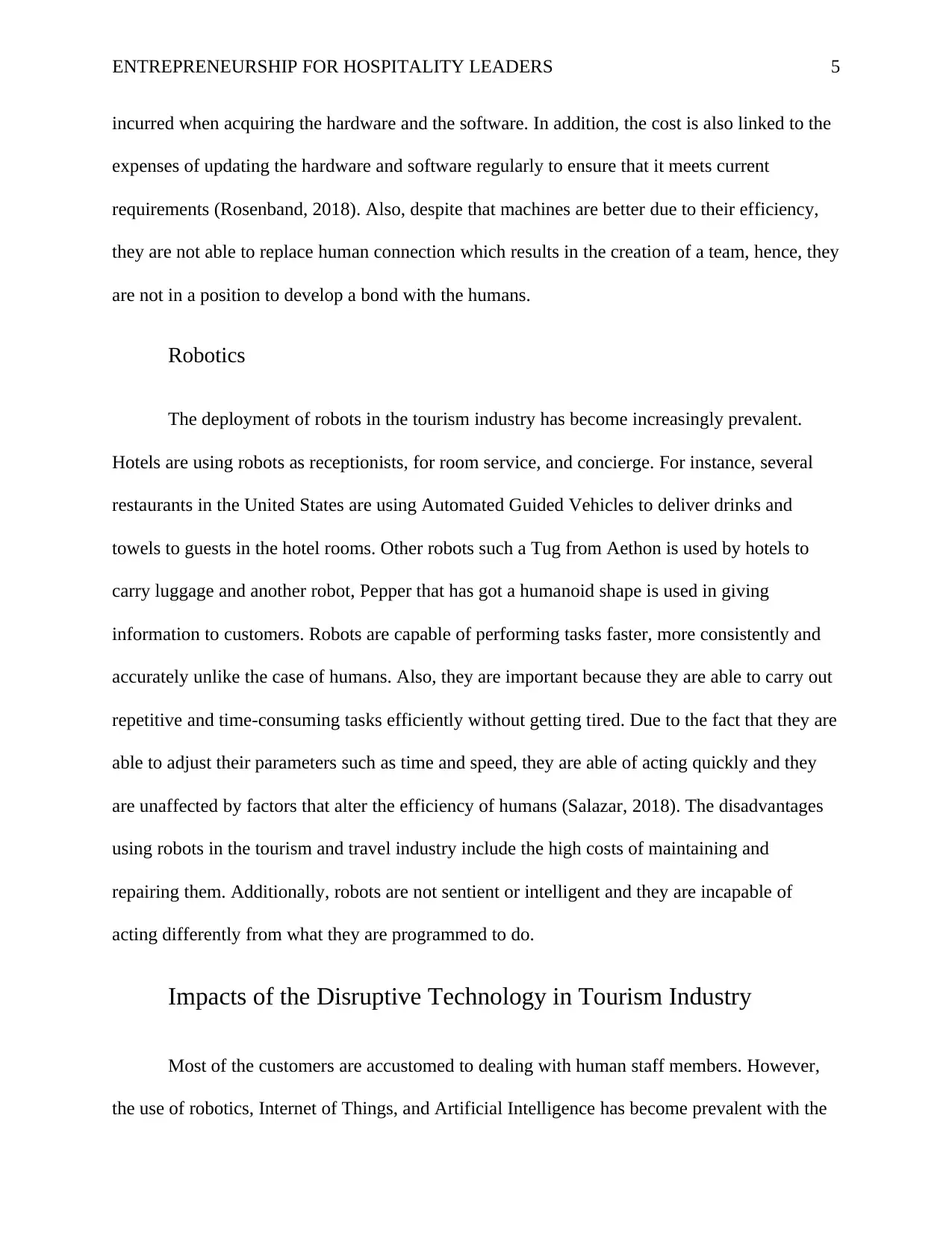
ENTREPRENEURSHIP FOR HOSPITALITY LEADERS 5
incurred when acquiring the hardware and the software. In addition, the cost is also linked to the
expenses of updating the hardware and software regularly to ensure that it meets current
requirements (Rosenband, 2018). Also, despite that machines are better due to their efficiency,
they are not able to replace human connection which results in the creation of a team, hence, they
are not in a position to develop a bond with the humans.
Robotics
The deployment of robots in the tourism industry has become increasingly prevalent.
Hotels are using robots as receptionists, for room service, and concierge. For instance, several
restaurants in the United States are using Automated Guided Vehicles to deliver drinks and
towels to guests in the hotel rooms. Other robots such a Tug from Aethon is used by hotels to
carry luggage and another robot, Pepper that has got a humanoid shape is used in giving
information to customers. Robots are capable of performing tasks faster, more consistently and
accurately unlike the case of humans. Also, they are important because they are able to carry out
repetitive and time-consuming tasks efficiently without getting tired. Due to the fact that they are
able to adjust their parameters such as time and speed, they are able of acting quickly and they
are unaffected by factors that alter the efficiency of humans (Salazar, 2018). The disadvantages
using robots in the tourism and travel industry include the high costs of maintaining and
repairing them. Additionally, robots are not sentient or intelligent and they are incapable of
acting differently from what they are programmed to do.
Impacts of the Disruptive Technology in Tourism Industry
Most of the customers are accustomed to dealing with human staff members. However,
the use of robotics, Internet of Things, and Artificial Intelligence has become prevalent with the
incurred when acquiring the hardware and the software. In addition, the cost is also linked to the
expenses of updating the hardware and software regularly to ensure that it meets current
requirements (Rosenband, 2018). Also, despite that machines are better due to their efficiency,
they are not able to replace human connection which results in the creation of a team, hence, they
are not in a position to develop a bond with the humans.
Robotics
The deployment of robots in the tourism industry has become increasingly prevalent.
Hotels are using robots as receptionists, for room service, and concierge. For instance, several
restaurants in the United States are using Automated Guided Vehicles to deliver drinks and
towels to guests in the hotel rooms. Other robots such a Tug from Aethon is used by hotels to
carry luggage and another robot, Pepper that has got a humanoid shape is used in giving
information to customers. Robots are capable of performing tasks faster, more consistently and
accurately unlike the case of humans. Also, they are important because they are able to carry out
repetitive and time-consuming tasks efficiently without getting tired. Due to the fact that they are
able to adjust their parameters such as time and speed, they are able of acting quickly and they
are unaffected by factors that alter the efficiency of humans (Salazar, 2018). The disadvantages
using robots in the tourism and travel industry include the high costs of maintaining and
repairing them. Additionally, robots are not sentient or intelligent and they are incapable of
acting differently from what they are programmed to do.
Impacts of the Disruptive Technology in Tourism Industry
Most of the customers are accustomed to dealing with human staff members. However,
the use of robotics, Internet of Things, and Artificial Intelligence has become prevalent with the
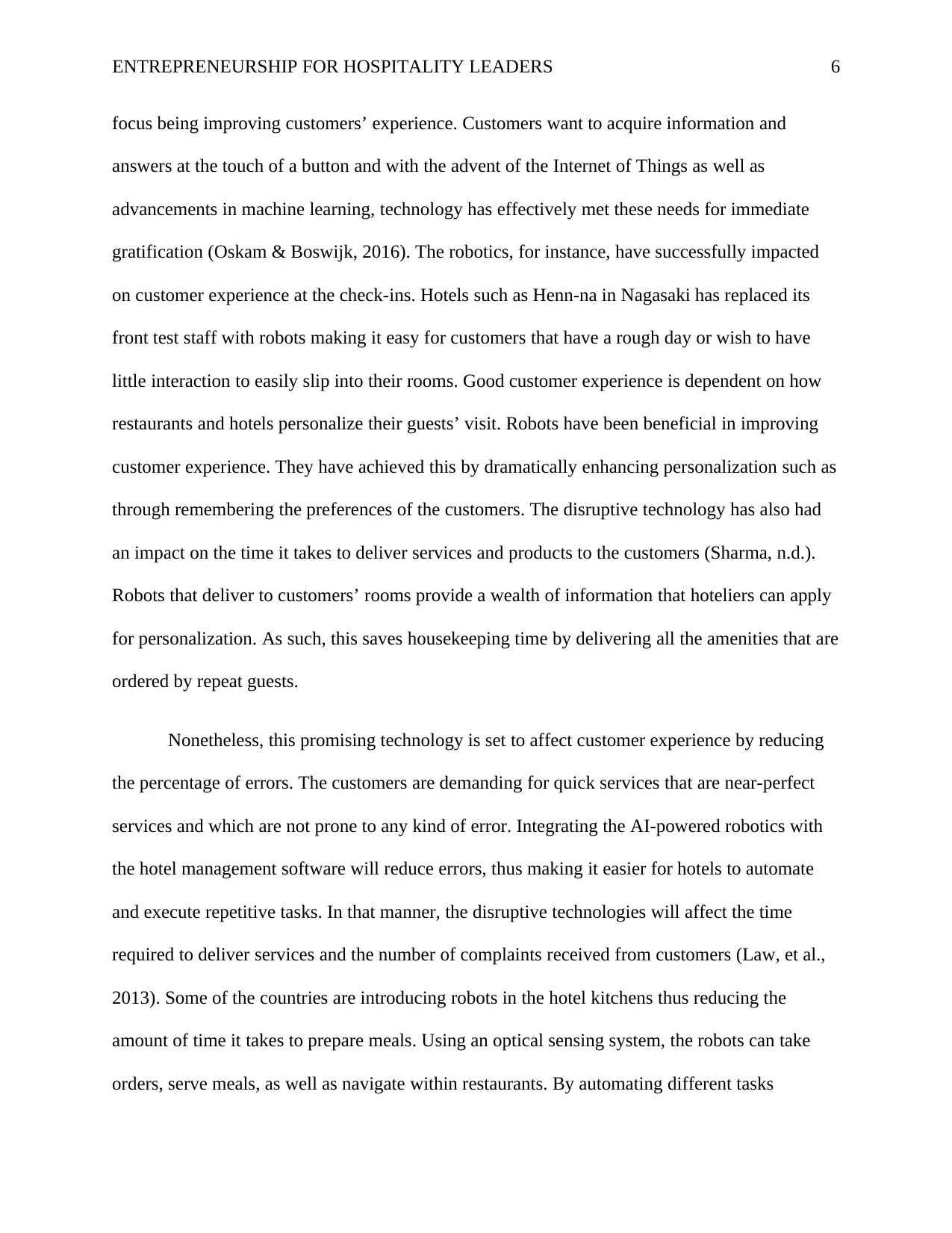
ENTREPRENEURSHIP FOR HOSPITALITY LEADERS 6
focus being improving customers’ experience. Customers want to acquire information and
answers at the touch of a button and with the advent of the Internet of Things as well as
advancements in machine learning, technology has effectively met these needs for immediate
gratification (Oskam & Boswijk, 2016). The robotics, for instance, have successfully impacted
on customer experience at the check-ins. Hotels such as Henn-na in Nagasaki has replaced its
front test staff with robots making it easy for customers that have a rough day or wish to have
little interaction to easily slip into their rooms. Good customer experience is dependent on how
restaurants and hotels personalize their guests’ visit. Robots have been beneficial in improving
customer experience. They have achieved this by dramatically enhancing personalization such as
through remembering the preferences of the customers. The disruptive technology has also had
an impact on the time it takes to deliver services and products to the customers (Sharma, n.d.).
Robots that deliver to customers’ rooms provide a wealth of information that hoteliers can apply
for personalization. As such, this saves housekeeping time by delivering all the amenities that are
ordered by repeat guests.
Nonetheless, this promising technology is set to affect customer experience by reducing
the percentage of errors. The customers are demanding for quick services that are near-perfect
services and which are not prone to any kind of error. Integrating the AI-powered robotics with
the hotel management software will reduce errors, thus making it easier for hotels to automate
and execute repetitive tasks. In that manner, the disruptive technologies will affect the time
required to deliver services and the number of complaints received from customers (Law, et al.,
2013). Some of the countries are introducing robots in the hotel kitchens thus reducing the
amount of time it takes to prepare meals. Using an optical sensing system, the robots can take
orders, serve meals, as well as navigate within restaurants. By automating different tasks
focus being improving customers’ experience. Customers want to acquire information and
answers at the touch of a button and with the advent of the Internet of Things as well as
advancements in machine learning, technology has effectively met these needs for immediate
gratification (Oskam & Boswijk, 2016). The robotics, for instance, have successfully impacted
on customer experience at the check-ins. Hotels such as Henn-na in Nagasaki has replaced its
front test staff with robots making it easy for customers that have a rough day or wish to have
little interaction to easily slip into their rooms. Good customer experience is dependent on how
restaurants and hotels personalize their guests’ visit. Robots have been beneficial in improving
customer experience. They have achieved this by dramatically enhancing personalization such as
through remembering the preferences of the customers. The disruptive technology has also had
an impact on the time it takes to deliver services and products to the customers (Sharma, n.d.).
Robots that deliver to customers’ rooms provide a wealth of information that hoteliers can apply
for personalization. As such, this saves housekeeping time by delivering all the amenities that are
ordered by repeat guests.
Nonetheless, this promising technology is set to affect customer experience by reducing
the percentage of errors. The customers are demanding for quick services that are near-perfect
services and which are not prone to any kind of error. Integrating the AI-powered robotics with
the hotel management software will reduce errors, thus making it easier for hotels to automate
and execute repetitive tasks. In that manner, the disruptive technologies will affect the time
required to deliver services and the number of complaints received from customers (Law, et al.,
2013). Some of the countries are introducing robots in the hotel kitchens thus reducing the
amount of time it takes to prepare meals. Using an optical sensing system, the robots can take
orders, serve meals, as well as navigate within restaurants. By automating different tasks
⊘ This is a preview!⊘
Do you want full access?
Subscribe today to unlock all pages.

Trusted by 1+ million students worldwide
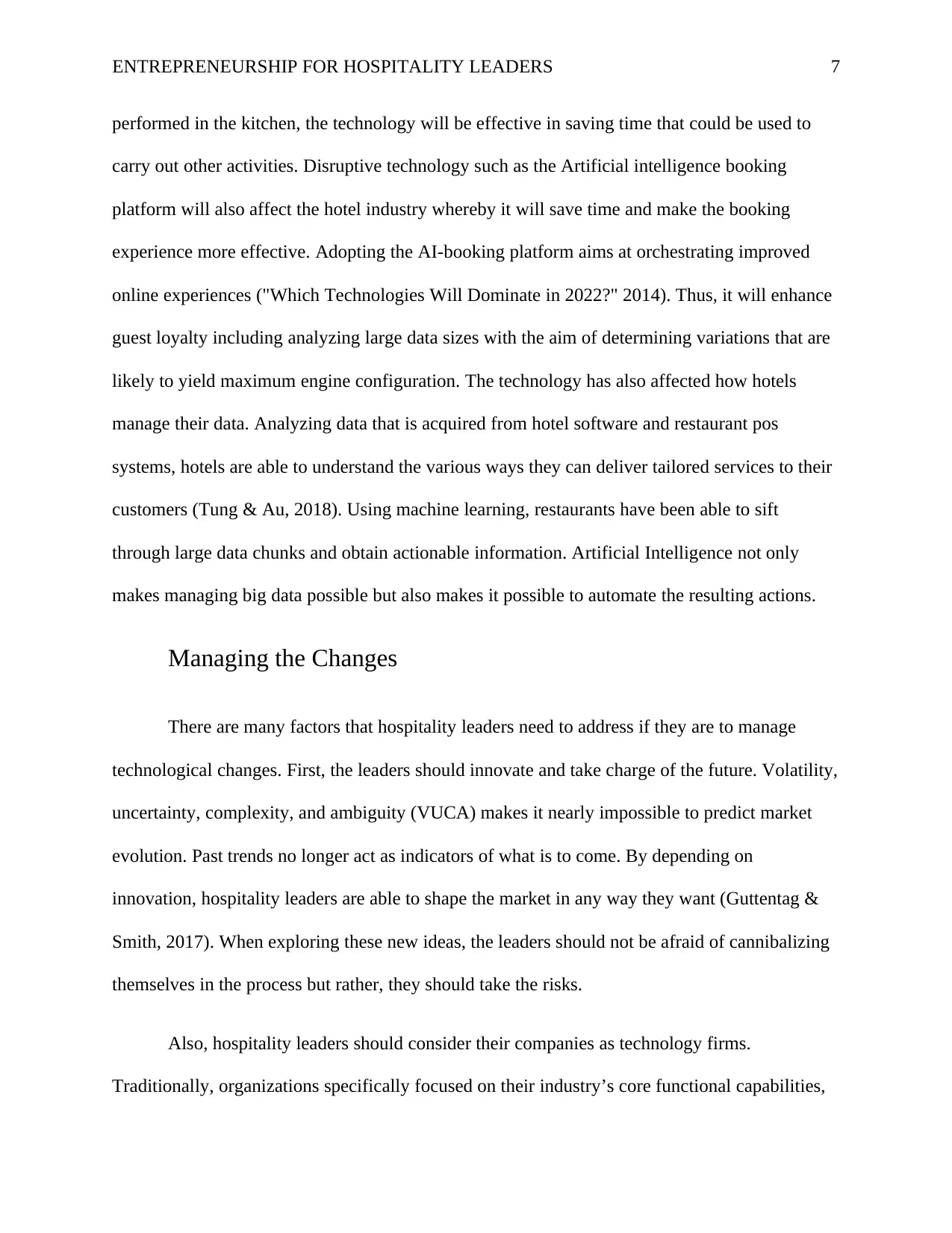
ENTREPRENEURSHIP FOR HOSPITALITY LEADERS 7
performed in the kitchen, the technology will be effective in saving time that could be used to
carry out other activities. Disruptive technology such as the Artificial intelligence booking
platform will also affect the hotel industry whereby it will save time and make the booking
experience more effective. Adopting the AI-booking platform aims at orchestrating improved
online experiences ("Which Technologies Will Dominate in 2022?" 2014). Thus, it will enhance
guest loyalty including analyzing large data sizes with the aim of determining variations that are
likely to yield maximum engine configuration. The technology has also affected how hotels
manage their data. Analyzing data that is acquired from hotel software and restaurant pos
systems, hotels are able to understand the various ways they can deliver tailored services to their
customers (Tung & Au, 2018). Using machine learning, restaurants have been able to sift
through large data chunks and obtain actionable information. Artificial Intelligence not only
makes managing big data possible but also makes it possible to automate the resulting actions.
Managing the Changes
There are many factors that hospitality leaders need to address if they are to manage
technological changes. First, the leaders should innovate and take charge of the future. Volatility,
uncertainty, complexity, and ambiguity (VUCA) makes it nearly impossible to predict market
evolution. Past trends no longer act as indicators of what is to come. By depending on
innovation, hospitality leaders are able to shape the market in any way they want (Guttentag &
Smith, 2017). When exploring these new ideas, the leaders should not be afraid of cannibalizing
themselves in the process but rather, they should take the risks.
Also, hospitality leaders should consider their companies as technology firms.
Traditionally, organizations specifically focused on their industry’s core functional capabilities,
performed in the kitchen, the technology will be effective in saving time that could be used to
carry out other activities. Disruptive technology such as the Artificial intelligence booking
platform will also affect the hotel industry whereby it will save time and make the booking
experience more effective. Adopting the AI-booking platform aims at orchestrating improved
online experiences ("Which Technologies Will Dominate in 2022?" 2014). Thus, it will enhance
guest loyalty including analyzing large data sizes with the aim of determining variations that are
likely to yield maximum engine configuration. The technology has also affected how hotels
manage their data. Analyzing data that is acquired from hotel software and restaurant pos
systems, hotels are able to understand the various ways they can deliver tailored services to their
customers (Tung & Au, 2018). Using machine learning, restaurants have been able to sift
through large data chunks and obtain actionable information. Artificial Intelligence not only
makes managing big data possible but also makes it possible to automate the resulting actions.
Managing the Changes
There are many factors that hospitality leaders need to address if they are to manage
technological changes. First, the leaders should innovate and take charge of the future. Volatility,
uncertainty, complexity, and ambiguity (VUCA) makes it nearly impossible to predict market
evolution. Past trends no longer act as indicators of what is to come. By depending on
innovation, hospitality leaders are able to shape the market in any way they want (Guttentag &
Smith, 2017). When exploring these new ideas, the leaders should not be afraid of cannibalizing
themselves in the process but rather, they should take the risks.
Also, hospitality leaders should consider their companies as technology firms.
Traditionally, organizations specifically focused on their industry’s core functional capabilities,
Paraphrase This Document
Need a fresh take? Get an instant paraphrase of this document with our AI Paraphraser
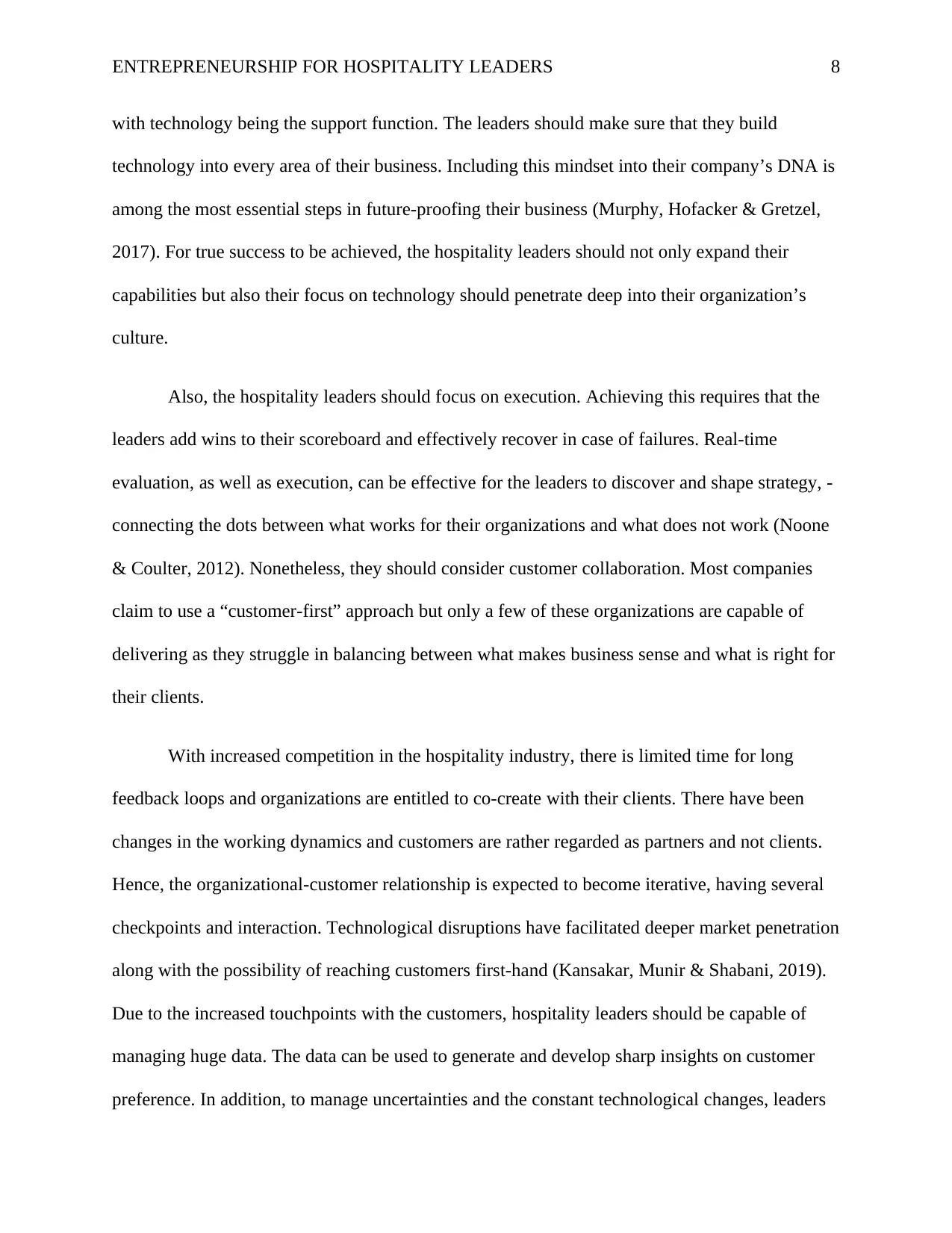
ENTREPRENEURSHIP FOR HOSPITALITY LEADERS 8
with technology being the support function. The leaders should make sure that they build
technology into every area of their business. Including this mindset into their company’s DNA is
among the most essential steps in future-proofing their business (Murphy, Hofacker & Gretzel,
2017). For true success to be achieved, the hospitality leaders should not only expand their
capabilities but also their focus on technology should penetrate deep into their organization’s
culture.
Also, the hospitality leaders should focus on execution. Achieving this requires that the
leaders add wins to their scoreboard and effectively recover in case of failures. Real-time
evaluation, as well as execution, can be effective for the leaders to discover and shape strategy, -
connecting the dots between what works for their organizations and what does not work (Noone
& Coulter, 2012). Nonetheless, they should consider customer collaboration. Most companies
claim to use a “customer-first” approach but only a few of these organizations are capable of
delivering as they struggle in balancing between what makes business sense and what is right for
their clients.
With increased competition in the hospitality industry, there is limited time for long
feedback loops and organizations are entitled to co-create with their clients. There have been
changes in the working dynamics and customers are rather regarded as partners and not clients.
Hence, the organizational-customer relationship is expected to become iterative, having several
checkpoints and interaction. Technological disruptions have facilitated deeper market penetration
along with the possibility of reaching customers first-hand (Kansakar, Munir & Shabani, 2019).
Due to the increased touchpoints with the customers, hospitality leaders should be capable of
managing huge data. The data can be used to generate and develop sharp insights on customer
preference. In addition, to manage uncertainties and the constant technological changes, leaders
with technology being the support function. The leaders should make sure that they build
technology into every area of their business. Including this mindset into their company’s DNA is
among the most essential steps in future-proofing their business (Murphy, Hofacker & Gretzel,
2017). For true success to be achieved, the hospitality leaders should not only expand their
capabilities but also their focus on technology should penetrate deep into their organization’s
culture.
Also, the hospitality leaders should focus on execution. Achieving this requires that the
leaders add wins to their scoreboard and effectively recover in case of failures. Real-time
evaluation, as well as execution, can be effective for the leaders to discover and shape strategy, -
connecting the dots between what works for their organizations and what does not work (Noone
& Coulter, 2012). Nonetheless, they should consider customer collaboration. Most companies
claim to use a “customer-first” approach but only a few of these organizations are capable of
delivering as they struggle in balancing between what makes business sense and what is right for
their clients.
With increased competition in the hospitality industry, there is limited time for long
feedback loops and organizations are entitled to co-create with their clients. There have been
changes in the working dynamics and customers are rather regarded as partners and not clients.
Hence, the organizational-customer relationship is expected to become iterative, having several
checkpoints and interaction. Technological disruptions have facilitated deeper market penetration
along with the possibility of reaching customers first-hand (Kansakar, Munir & Shabani, 2019).
Due to the increased touchpoints with the customers, hospitality leaders should be capable of
managing huge data. The data can be used to generate and develop sharp insights on customer
preference. In addition, to manage uncertainties and the constant technological changes, leaders
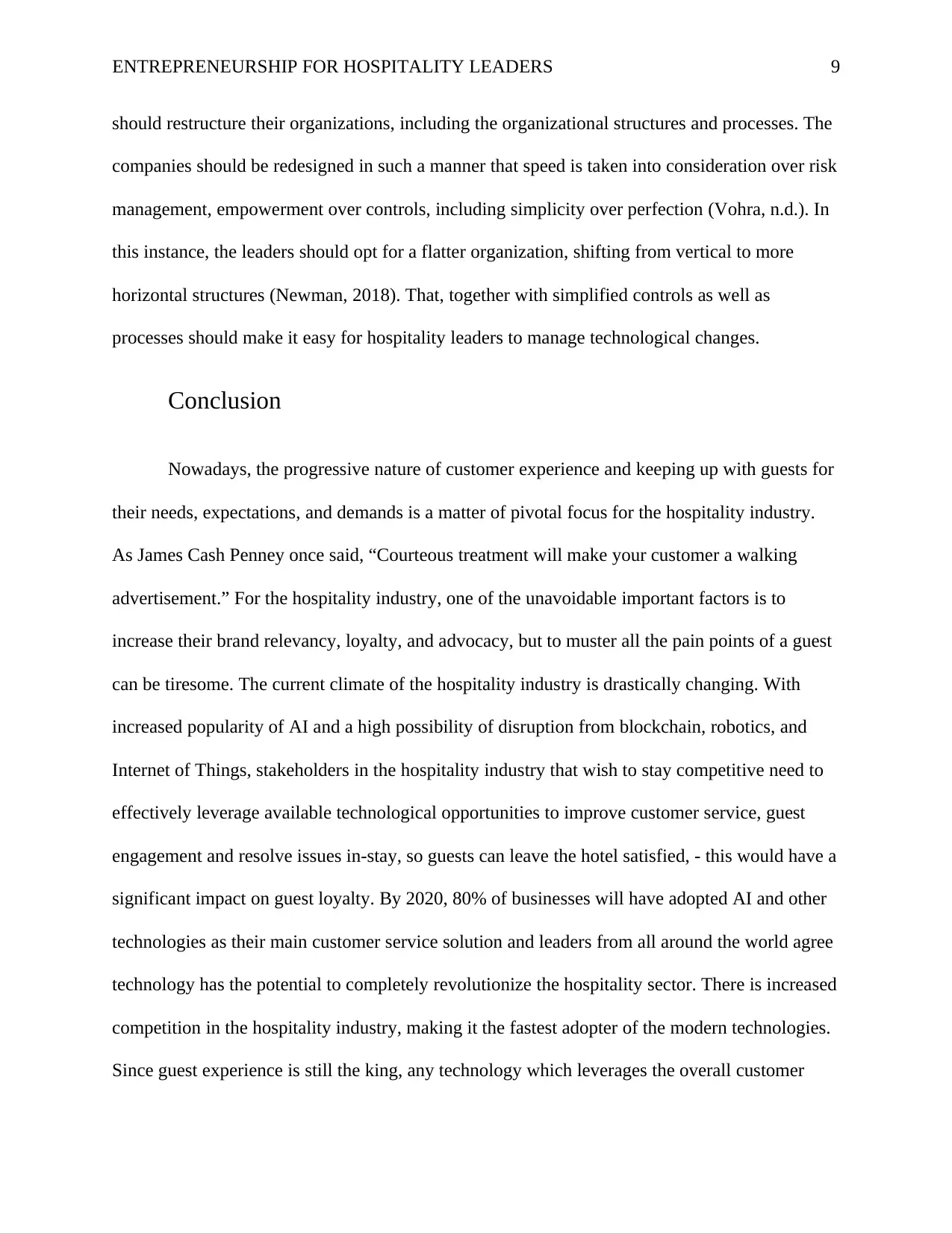
ENTREPRENEURSHIP FOR HOSPITALITY LEADERS 9
should restructure their organizations, including the organizational structures and processes. The
companies should be redesigned in such a manner that speed is taken into consideration over risk
management, empowerment over controls, including simplicity over perfection (Vohra, n.d.). In
this instance, the leaders should opt for a flatter organization, shifting from vertical to more
horizontal structures (Newman, 2018). That, together with simplified controls as well as
processes should make it easy for hospitality leaders to manage technological changes.
Conclusion
Nowadays, the progressive nature of customer experience and keeping up with guests for
their needs, expectations, and demands is a matter of pivotal focus for the hospitality industry.
As James Cash Penney once said, “Courteous treatment will make your customer a walking
advertisement.” For the hospitality industry, one of the unavoidable important factors is to
increase their brand relevancy, loyalty, and advocacy, but to muster all the pain points of a guest
can be tiresome. The current climate of the hospitality industry is drastically changing. With
increased popularity of AI and a high possibility of disruption from blockchain, robotics, and
Internet of Things, stakeholders in the hospitality industry that wish to stay competitive need to
effectively leverage available technological opportunities to improve customer service, guest
engagement and resolve issues in-stay, so guests can leave the hotel satisfied, - this would have a
significant impact on guest loyalty. By 2020, 80% of businesses will have adopted AI and other
technologies as their main customer service solution and leaders from all around the world agree
technology has the potential to completely revolutionize the hospitality sector. There is increased
competition in the hospitality industry, making it the fastest adopter of the modern technologies.
Since guest experience is still the king, any technology which leverages the overall customer
should restructure their organizations, including the organizational structures and processes. The
companies should be redesigned in such a manner that speed is taken into consideration over risk
management, empowerment over controls, including simplicity over perfection (Vohra, n.d.). In
this instance, the leaders should opt for a flatter organization, shifting from vertical to more
horizontal structures (Newman, 2018). That, together with simplified controls as well as
processes should make it easy for hospitality leaders to manage technological changes.
Conclusion
Nowadays, the progressive nature of customer experience and keeping up with guests for
their needs, expectations, and demands is a matter of pivotal focus for the hospitality industry.
As James Cash Penney once said, “Courteous treatment will make your customer a walking
advertisement.” For the hospitality industry, one of the unavoidable important factors is to
increase their brand relevancy, loyalty, and advocacy, but to muster all the pain points of a guest
can be tiresome. The current climate of the hospitality industry is drastically changing. With
increased popularity of AI and a high possibility of disruption from blockchain, robotics, and
Internet of Things, stakeholders in the hospitality industry that wish to stay competitive need to
effectively leverage available technological opportunities to improve customer service, guest
engagement and resolve issues in-stay, so guests can leave the hotel satisfied, - this would have a
significant impact on guest loyalty. By 2020, 80% of businesses will have adopted AI and other
technologies as their main customer service solution and leaders from all around the world agree
technology has the potential to completely revolutionize the hospitality sector. There is increased
competition in the hospitality industry, making it the fastest adopter of the modern technologies.
Since guest experience is still the king, any technology which leverages the overall customer
⊘ This is a preview!⊘
Do you want full access?
Subscribe today to unlock all pages.

Trusted by 1+ million students worldwide
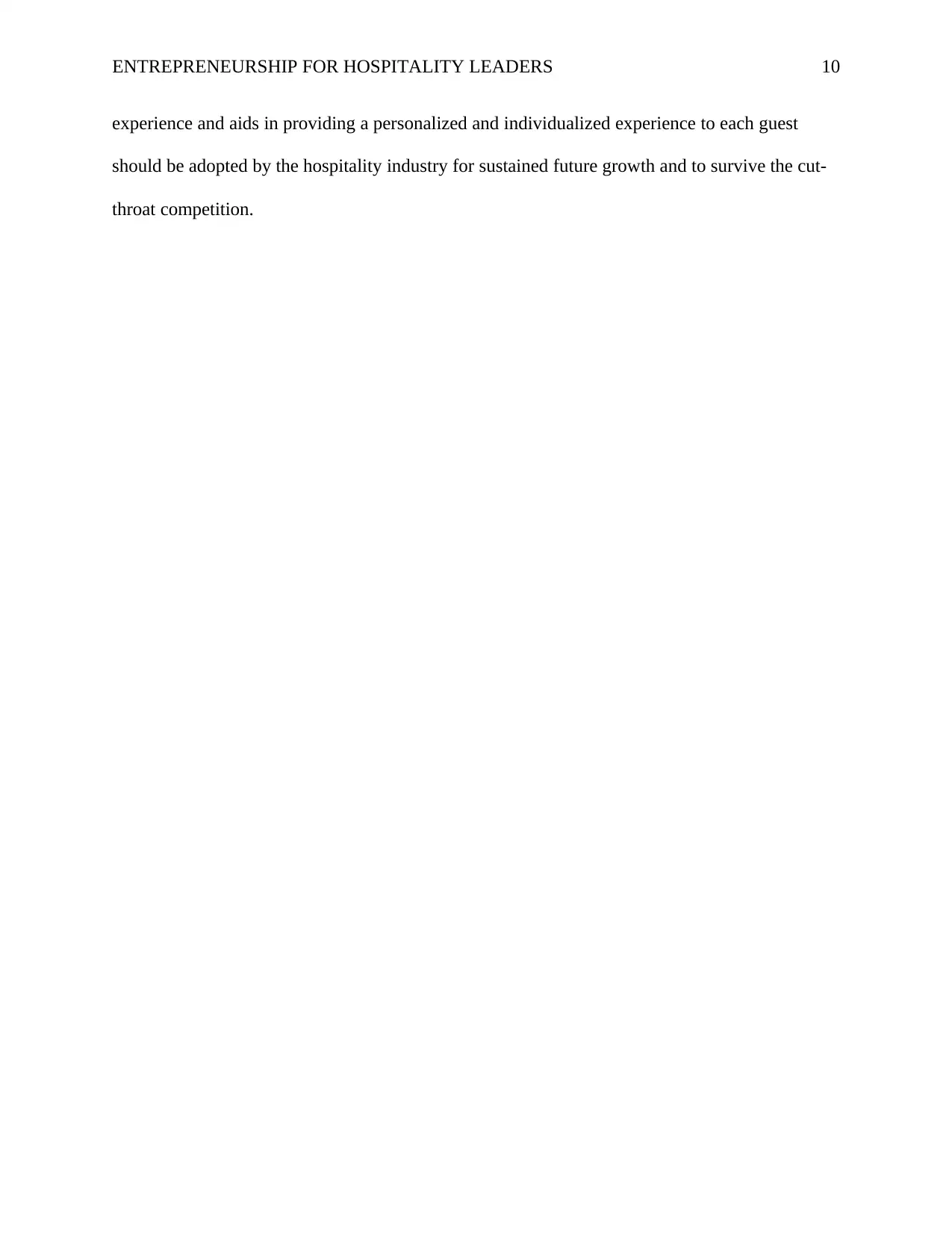
ENTREPRENEURSHIP FOR HOSPITALITY LEADERS 10
experience and aids in providing a personalized and individualized experience to each guest
should be adopted by the hospitality industry for sustained future growth and to survive the cut-
throat competition.
experience and aids in providing a personalized and individualized experience to each guest
should be adopted by the hospitality industry for sustained future growth and to survive the cut-
throat competition.
Paraphrase This Document
Need a fresh take? Get an instant paraphrase of this document with our AI Paraphraser
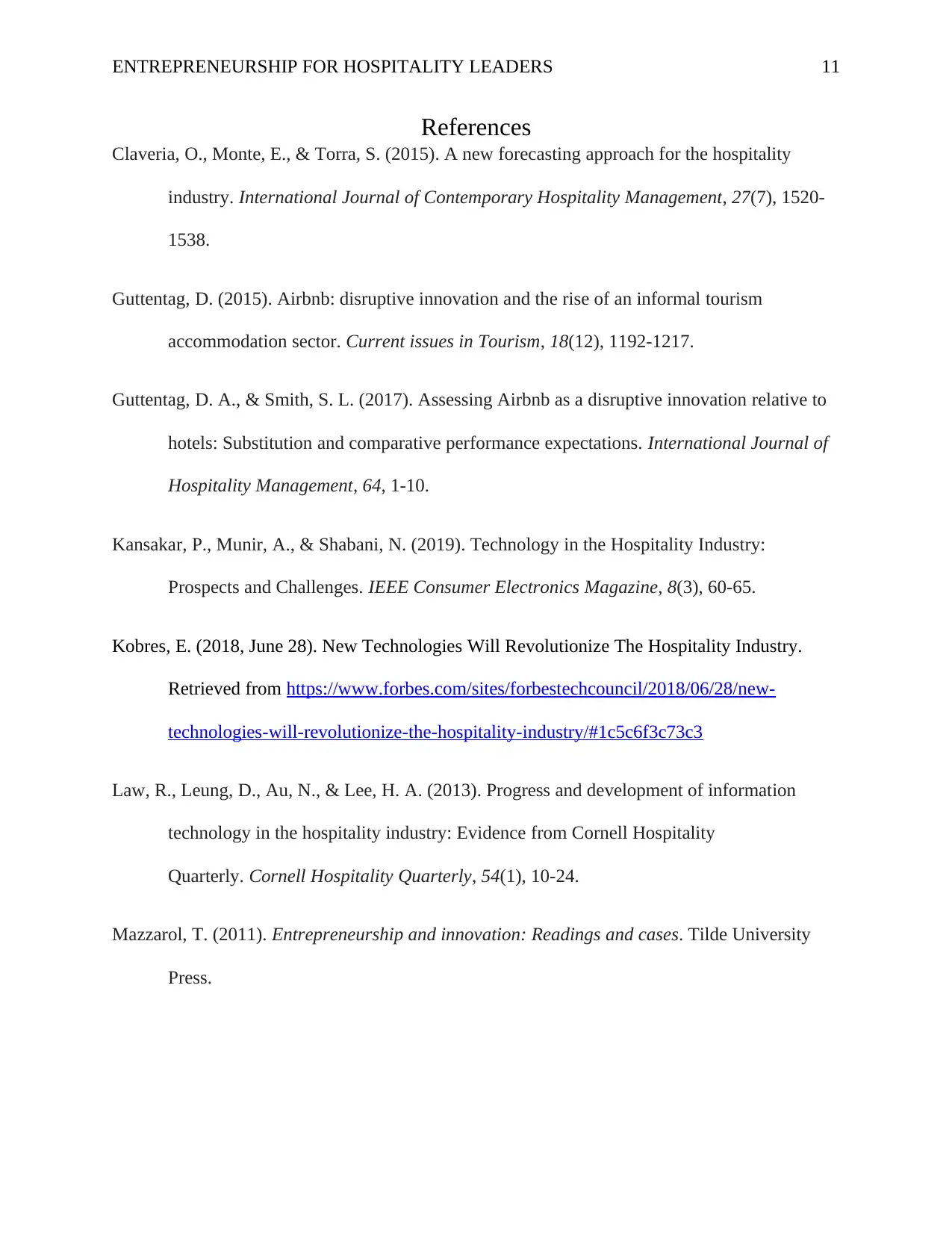
ENTREPRENEURSHIP FOR HOSPITALITY LEADERS 11
References
Claveria, O., Monte, E., & Torra, S. (2015). A new forecasting approach for the hospitality
industry. International Journal of Contemporary Hospitality Management, 27(7), 1520-
1538.
Guttentag, D. (2015). Airbnb: disruptive innovation and the rise of an informal tourism
accommodation sector. Current issues in Tourism, 18(12), 1192-1217.
Guttentag, D. A., & Smith, S. L. (2017). Assessing Airbnb as a disruptive innovation relative to
hotels: Substitution and comparative performance expectations. International Journal of
Hospitality Management, 64, 1-10.
Kansakar, P., Munir, A., & Shabani, N. (2019). Technology in the Hospitality Industry:
Prospects and Challenges. IEEE Consumer Electronics Magazine, 8(3), 60-65.
Kobres, E. (2018, June 28). New Technologies Will Revolutionize The Hospitality Industry.
Retrieved from https://www.forbes.com/sites/forbestechcouncil/2018/06/28/new-
technologies-will-revolutionize-the-hospitality-industry/#1c5c6f3c73c3
Law, R., Leung, D., Au, N., & Lee, H. A. (2013). Progress and development of information
technology in the hospitality industry: Evidence from Cornell Hospitality
Quarterly. Cornell Hospitality Quarterly, 54(1), 10-24.
Mazzarol, T. (2011). Entrepreneurship and innovation: Readings and cases. Tilde University
Press.
References
Claveria, O., Monte, E., & Torra, S. (2015). A new forecasting approach for the hospitality
industry. International Journal of Contemporary Hospitality Management, 27(7), 1520-
1538.
Guttentag, D. (2015). Airbnb: disruptive innovation and the rise of an informal tourism
accommodation sector. Current issues in Tourism, 18(12), 1192-1217.
Guttentag, D. A., & Smith, S. L. (2017). Assessing Airbnb as a disruptive innovation relative to
hotels: Substitution and comparative performance expectations. International Journal of
Hospitality Management, 64, 1-10.
Kansakar, P., Munir, A., & Shabani, N. (2019). Technology in the Hospitality Industry:
Prospects and Challenges. IEEE Consumer Electronics Magazine, 8(3), 60-65.
Kobres, E. (2018, June 28). New Technologies Will Revolutionize The Hospitality Industry.
Retrieved from https://www.forbes.com/sites/forbestechcouncil/2018/06/28/new-
technologies-will-revolutionize-the-hospitality-industry/#1c5c6f3c73c3
Law, R., Leung, D., Au, N., & Lee, H. A. (2013). Progress and development of information
technology in the hospitality industry: Evidence from Cornell Hospitality
Quarterly. Cornell Hospitality Quarterly, 54(1), 10-24.
Mazzarol, T. (2011). Entrepreneurship and innovation: Readings and cases. Tilde University
Press.
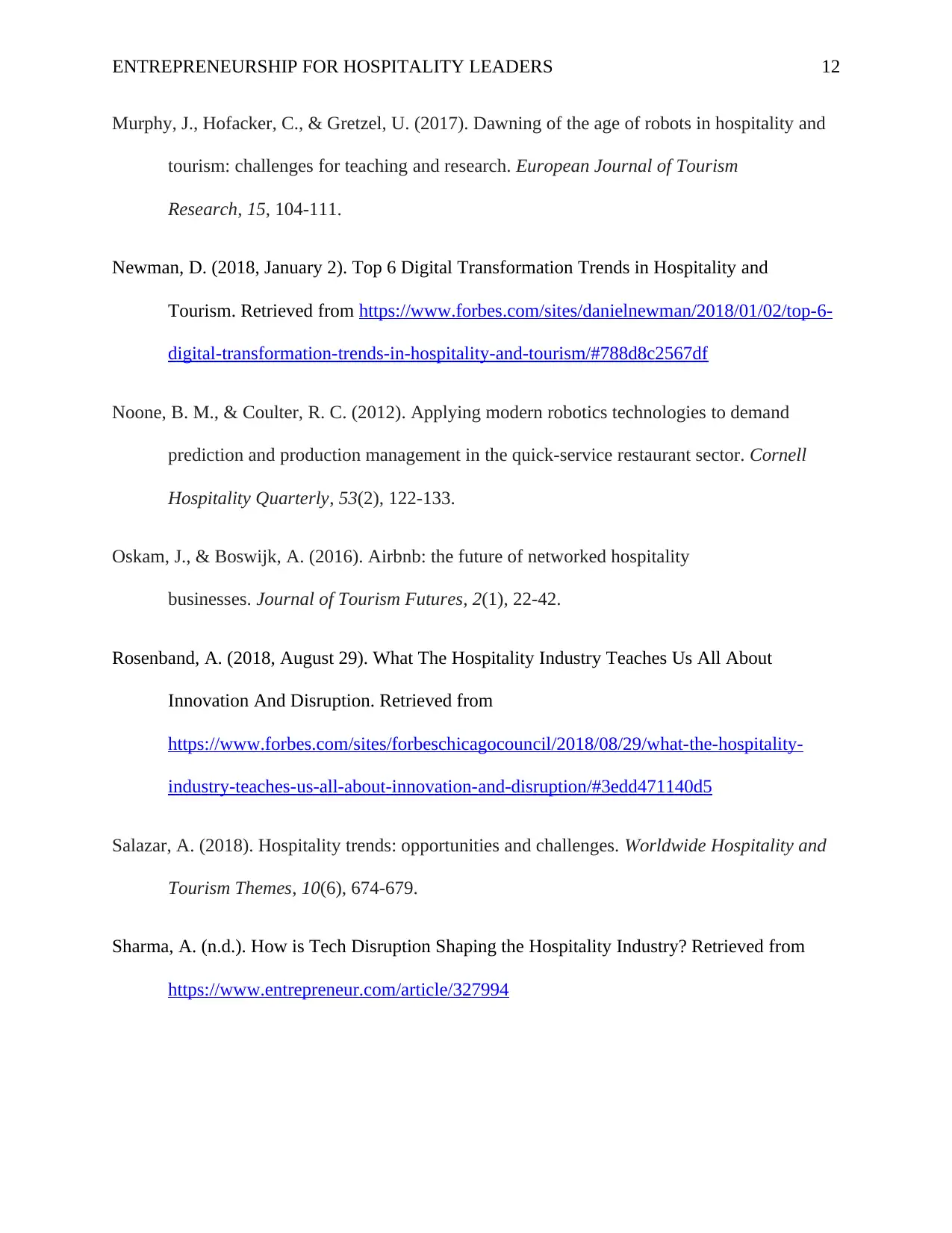
ENTREPRENEURSHIP FOR HOSPITALITY LEADERS 12
Murphy, J., Hofacker, C., & Gretzel, U. (2017). Dawning of the age of robots in hospitality and
tourism: challenges for teaching and research. European Journal of Tourism
Research, 15, 104-111.
Newman, D. (2018, January 2). Top 6 Digital Transformation Trends in Hospitality and
Tourism. Retrieved from https://www.forbes.com/sites/danielnewman/2018/01/02/top-6-
digital-transformation-trends-in-hospitality-and-tourism/#788d8c2567df
Noone, B. M., & Coulter, R. C. (2012). Applying modern robotics technologies to demand
prediction and production management in the quick-service restaurant sector. Cornell
Hospitality Quarterly, 53(2), 122-133.
Oskam, J., & Boswijk, A. (2016). Airbnb: the future of networked hospitality
businesses. Journal of Tourism Futures, 2(1), 22-42.
Rosenband, A. (2018, August 29). What The Hospitality Industry Teaches Us All About
Innovation And Disruption. Retrieved from
https://www.forbes.com/sites/forbeschicagocouncil/2018/08/29/what-the-hospitality-
industry-teaches-us-all-about-innovation-and-disruption/#3edd471140d5
Salazar, A. (2018). Hospitality trends: opportunities and challenges. Worldwide Hospitality and
Tourism Themes, 10(6), 674-679.
Sharma, A. (n.d.). How is Tech Disruption Shaping the Hospitality Industry? Retrieved from
https://www.entrepreneur.com/article/327994
Murphy, J., Hofacker, C., & Gretzel, U. (2017). Dawning of the age of robots in hospitality and
tourism: challenges for teaching and research. European Journal of Tourism
Research, 15, 104-111.
Newman, D. (2018, January 2). Top 6 Digital Transformation Trends in Hospitality and
Tourism. Retrieved from https://www.forbes.com/sites/danielnewman/2018/01/02/top-6-
digital-transformation-trends-in-hospitality-and-tourism/#788d8c2567df
Noone, B. M., & Coulter, R. C. (2012). Applying modern robotics technologies to demand
prediction and production management in the quick-service restaurant sector. Cornell
Hospitality Quarterly, 53(2), 122-133.
Oskam, J., & Boswijk, A. (2016). Airbnb: the future of networked hospitality
businesses. Journal of Tourism Futures, 2(1), 22-42.
Rosenband, A. (2018, August 29). What The Hospitality Industry Teaches Us All About
Innovation And Disruption. Retrieved from
https://www.forbes.com/sites/forbeschicagocouncil/2018/08/29/what-the-hospitality-
industry-teaches-us-all-about-innovation-and-disruption/#3edd471140d5
Salazar, A. (2018). Hospitality trends: opportunities and challenges. Worldwide Hospitality and
Tourism Themes, 10(6), 674-679.
Sharma, A. (n.d.). How is Tech Disruption Shaping the Hospitality Industry? Retrieved from
https://www.entrepreneur.com/article/327994
⊘ This is a preview!⊘
Do you want full access?
Subscribe today to unlock all pages.

Trusted by 1+ million students worldwide
1 out of 16
Related Documents
Your All-in-One AI-Powered Toolkit for Academic Success.
+13062052269
info@desklib.com
Available 24*7 on WhatsApp / Email
![[object Object]](/_next/static/media/star-bottom.7253800d.svg)
Unlock your academic potential
Copyright © 2020–2026 A2Z Services. All Rights Reserved. Developed and managed by ZUCOL.





